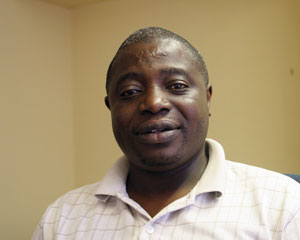
Corruption has become a grave issue in Zimbabwe with government doing little to curb the scourge. NewsDay reporter Moses Matenga (ND) spoke to Loughty Dube (LD), the newly elected chairperson of corruption watchdog, Transparency International — Zimbabwe, about the levels of corruption in the country and what needs to be done to address the endemic.
ND: As Transparency International Zimbabwe, what’s your assessment of corruption levels in Zimbabwe?
LD: Transparency International (TI) launched the Corruption Perception Index (CPI) which ranks countries based on how corrupt their public sector is perceived to be and is measured accordingly. Last year, in 2012, Zimbabwe was ranked 163 out of 176 countries surveyed.
In 2011, Zimbabwe had an overall rank of 154 out of 182 countries assessed. That score reveals that corruption is on the increase in Zimbabwe and that is very worrying, to say the least. In Zimbabwe, corruption seems to be now acceptable as a way of life.
Over the years a lot of corruption issues have emerged in the media from some of the key institutions and sectors such as education, health, mining, sports, and agriculture, among others.
Most worryingly, the extractive industry has been tainted with incidents of bribery in the issuing of mining licences and claims and tendencies related to proceeds from the mining sector.
ND: Having said that, who therefore do you think is to blame for the high corruption levels in Zimbabwe?
LD: In Zimbabwe, corruption is a key governance issue which is affecting development and the democratisation process and there is need for the government to step up anti-corruption initiatives. That can happen when politicians show the will to combat corruption. In the past, there has been no commitment from government and those in power to dealing with corruption. Government officials have themselves been accused of being at the fore-front of corrupt activities.
- Chamisa under fire over US$120K donation
- Mavhunga puts DeMbare into Chibuku quarterfinals
- Pension funds bet on Cabora Bassa oilfields
- Councils defy govt fire tender directive
Keep Reading
There is an urgent need for the government to increase transparency and accountability in the public sector as a takeoff point to address corruption in the country.
The government must prioritise better rules on lobbying and political financing, make public spending and contracting more transparent and make public officials and institutions more accountable.
ND: But we have the Zimbabwe Anti-Corruption Commission (Zacc) in place, isn’t it a sign of commitment by government to combat corruption?
LD: Zacc remains incapacitated to achieve its mandate and the latest episode where the commission’s officials were arrested when they sought to have certain ministers’ offices searched after obtaining a High Court order giving them the green light to do so, is worrying, to say the least.
While legal frameworks to combat corruption exist, it is also imperative to move towards implementing and enforcing various legislation. Such legislation includes the Criminal Law (Codification and Reform) Act, and the Prevention of Corruption Act, among others. The government also needs to implement and enforce international instruments, such as the United Nations Convention Against Corruption, that deter abuse of office.
ND: There is growing concern also that corruption is difficult to deal with as citizens are also participating in corrupt acts?
LD: Citizens should also be educated to participate in the eradication of corruption since corruption has a demand and supply side. It is important that the citizens of this country take a lead in fighting corruption by desisting from paying bribes and kickbacks, especially to police at roadblocks. It is imperative for Zimbabweans to understand that the power to combat corruption does not lie in the various pieces of legislation and institutions and statutes that we have, but in each and every Zimbabwean.
Corruption — just like any other bad habit — is a culture that a people can choose to adopt and live with, but the results for a corrupt society is poverty for the majority and added benefits to a corrupt few.
However, it is important to note that for the fight against corruption to be successful, the government, through its top leadership, should have zero tolerance for corruption and when the top leadership adopts a tougher stance against the abuse of power, then the attitude cascades to all corridors of government.
Corruption in Zimbabwe has become endemic in all spheres of society — in political, civil society and in private enterprise — and it is imperative that those in power should have the willpower to deal with this problem before it reaches cancerous levels.
ND: Do you think the principals in the Government of National Unity have done enough to address corruption matters in the country?
LD: The unity government has not done anything different to warrant a change of perception on the way corruption is seen and dealt with in this country.
Despite the existence of Zacc and a plethora of laws to deal with corruption, none of these laws have been applied. The three principals in the inclusive government have not come out strongly to condemn corrupt activities.
The inclusive government has not been transparent and open in assuring the public on the mining industry and there is open speculation on what proceeds from the diamond fields are being used on.
Zacc has not received the political support and assurances that its members will be protected when they effectively execute their mandate. The arrest of Zacc officials in March this year is testimony of the dangerous ground the commission is treading on.
The arrest of Zacc officials has sent a wrong message to the public who only view the fight against corruption as targeting those in the lower echelons of society while those at the upper echelons are viewed as untouchables.
The government has not prioritised the fight against corruption and Zacc is failing to execute its duties properly because of lack of resources and support from the inclusive government.











